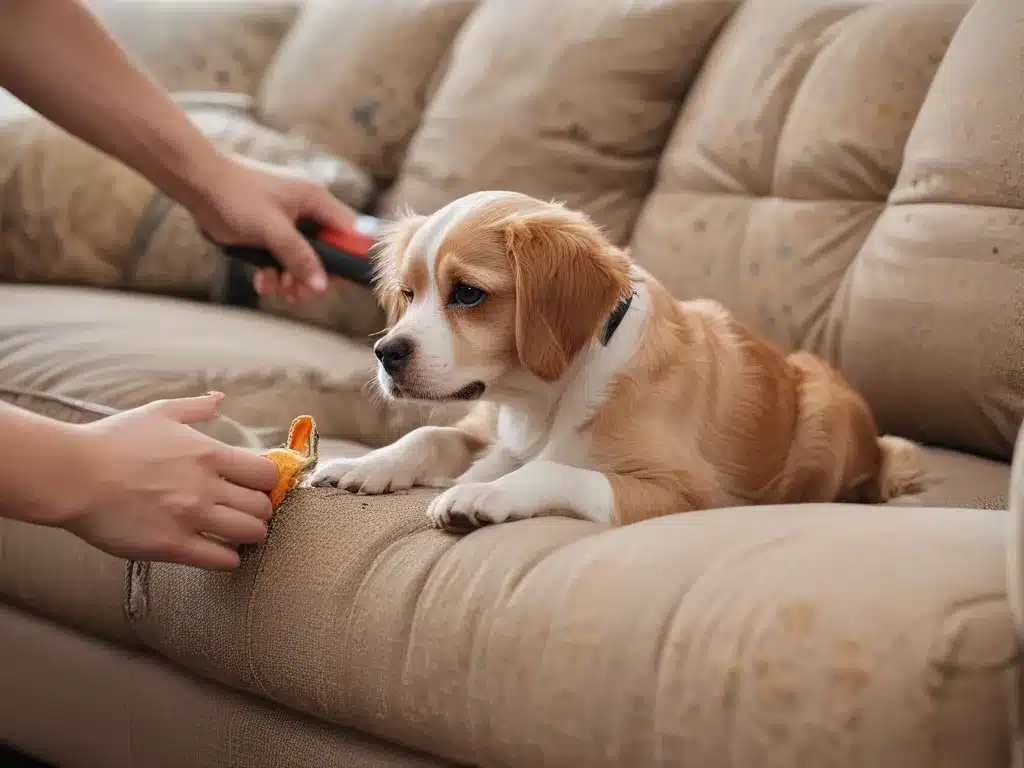Introduction
As a pet owner, I know firsthand how challenging it can be to keep upholstered furniture clean and fresh. Pets can leave behind a variety of messes, from fur and dander to urine stains and vomit. Dealing with these messes promptly and effectively is crucial to maintaining a hygienic living environment and prolonging the lifespan of your furniture. In this article, I’ll share my tried-and-true methods for cleaning pet messes out of upholstery, covering everything from spot cleaning to deep cleaning and odor removal.
Types of Pet Messes
Before diving into cleaning techniques, let’s first understand the different types of messes we’re dealing with:
- Fur and Dander: Pets shed fur and dander, which can accumulate on upholstery, causing allergies and an unsightly appearance.
- Urine Stains: Pet urine can leave unsightly stains and unpleasant odors on upholstered furniture.
- Vomit and Feces: Accidents can happen, and pets may vomit or have a fecal accident on your upholstery.
- Mud and Dirt: Pets can track in mud and dirt from outside, leaving your upholstery looking dingy and stained.
Spot Cleaning Pet Messes
Regular spot cleaning is essential to prevent pet messes from setting in and becoming more difficult to remove. Here’s how I approach spot cleaning:
Step 1: Act Quickly
As soon as you notice a pet mess, act quickly to prevent it from setting and becoming more challenging to remove. The longer a stain or mess sits, the harder it will be to clean.
Step 2: Blot the Area
Use a clean, absorbent cloth or paper towels to blot the affected area gently. Don’t rub, as this can spread the mess and push it deeper into the upholstery fibers.
Step 3: Apply a Cleaning Solution
Choose a pet-safe cleaning solution suitable for the type of mess you’re dealing with. For urine stains, an enzymatic cleaner is often recommended, as it breaks down the proteins in urine. For other messes, a mild detergent or upholstery cleaner may work well.
Step 4: Scrub and Blot
Use a clean cloth or soft-bristled brush to gently scrub the affected area with the cleaning solution. Blot the area with a clean, dry cloth to absorb as much moisture as possible.
Step 5: Rinse and Dry
Once the stain or mess has been lifted, rinse the area with clean water to remove any remaining cleaning solution. Blot the area dry with a clean, absorbent cloth or towel.
Deep Cleaning Upholstery
While spot cleaning is essential for tackling fresh messes, deep cleaning your upholstered furniture is necessary to remove embedded dirt, dander, and odors. Here’s how I approach deep cleaning:
Step 1: Prepare the Area
Remove any cushions or detachable covers from the upholstered furniture. Vacuum the upholstery thoroughly to remove loose dirt, hair, and debris.
Step 2: Apply a Pre-Treatment Solution
Use a pre-treatment solution designed for upholstery to help break down tough stains and odors. Follow the manufacturer’s instructions for application and dwell time.
Step 3: Clean with an Upholstery Cleaner
Use an upholstery cleaner specifically formulated for the type of fabric you’re cleaning. Follow the manufacturer’s instructions for dilution and application. Work in sections, gently scrubbing the cleaner into the upholstery with a soft-bristled brush or upholstery cleaning machine.
Step 4: Rinse and Extract
Rinse the upholstery with clean water to remove any remaining cleaner and dissolved dirt. Use an upholstery cleaning machine or a wet/dry vacuum to extract as much moisture as possible from the upholstery.
Step 5: Dry and Deodorize
Allow the upholstery to dry completely, using fans or dehumidifiers if necessary. Once dry, consider using a pet-safe deodorizer or enzyme treatment to eliminate any lingering odors.
Odor Removal
Pet odors can be stubborn and challenging to remove from upholstery. Here are some effective methods I’ve used for eliminating pet odors:
Baking Soda
Baking soda is a natural odor absorbent and can be effective in removing pet odors from upholstery. Sprinkle baking soda liberally over the affected area and let it sit for several hours (or overnight, if possible). Vacuum up the baking soda thoroughly when finished.
Enzymatic Cleaners
Enzymatic cleaners are designed to break down the organic compounds that cause pet odors. Look for products specifically formulated for pet odor removal and follow the manufacturer’s instructions for application and dwell time.
Vinegar Solution
A vinegar solution can help neutralize pet odors and remove stains. Mix equal parts white vinegar and water in a spray bottle, and apply the solution to the affected area. Let it sit for several minutes, then blot dry with a clean cloth.
Professional Cleaning
In some cases, professional upholstery cleaning may be necessary to tackle stubborn pet odors fully. Professional cleaners have access to specialized equipment and solutions that can effectively remove even the most deeply embedded odors.
Prevention Tips
While cleaning pet messes from upholstery is important, preventing them in the first place can save you time and effort. Here are some prevention tips:
- Regular Grooming: Brush your pets regularly to minimize shedding and dander on your upholstery.
- Designated Pet Areas: Consider designating specific areas or furniture for your pets to minimize messes on your upholstered furniture.
- Potty Training: Properly potty train your pets to reduce accidents and urine stains on your upholstery.
- Protective Covers: Use removable slipcovers or furniture covers to protect your upholstery from pet messes.
- Prompt Cleanup: Address pet messes promptly to prevent them from setting and becoming more difficult to remove.
Conclusion
Cleaning pet messes out of upholstery can be a challenging task, but with the right techniques and products, it’s definitely achievable. Regular spot cleaning, deep cleaning, and odor removal methods can help keep your upholstered furniture looking and smelling fresh. Remember, prevention is key, so incorporate grooming, potty training, and protective measures into your routine to minimize pet messes on your upholstery.







